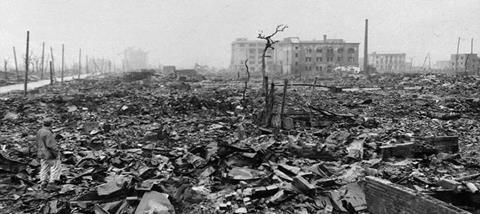
One figure stands out for me: 93%.
This is the estimated percentage of nurses in Hiroshima who were killed when the bomb dropped, seventy years ago today. For doctors, the figure was 90%. These numbers were produced by researchers working for the US government in 1946.
The lack of medical staff added to the death toll. In both cities, tens of thousands were killed instantly. At least as many died from burns and radiation. Others died from starvation and malnutrition as people were left homeless and hungry. There were people who died gradually over years.
Then there are the living wounded, left with physical and mental scars that can never be counted.
Nothing can persuade me that this was anything other than an act of mass murder.
The argument most often given in favour of the bombing is that more people would have died if the bombs had not been dropped.
This is highly doubtful. Apart from the quick deaths, other forms of warfare would not have involved the numbers dying gradually from radiation and related conditions.
But even if the number of deaths was lower (and even if the USA's war aims were justified), this still does not make the atomic bombings acceptable. Only by dehumanising a civilian population of millions, only be replacing the most basic instincts of compassion with an inhuman numerical calculation, could this attack possibly seem right.
When Jesus told the story of the good Samaritan, he mentioned a priest and Levite who passed by on the other side. They may, for all we know, have been on the way to somewhere important. They may have been going to do a good deed, perhaps to help somebody, or lots of people. They might have calculated that more people would lose out if they did not carry on. But the Samaritan saw a suffering human being and stopped to help.
If compassion means anything, it means putting our common humanity above cold calculations.
I am not saying that Christians should be naïve or that we should ignore political realities. As Jesus said, we should be as wise as serpents and innocent as doves. However, we view political complexities not as the ultimate reality, but as one part a much bigger reality. Will we serve the kingdom of God or the kingdoms of this world? The idols of Mammon and Mars or the living God whose son told his companions to put their swords away even as he faced execution?
This issue is vitally relevant today. Next year, Parliament will vote on the renewal of Trident, a collection of weapons of mass destruction that would kill several hundred times as many people as the bombs that hit Japan. Christian churches still represent a sizeable number of people in the UK. If we mobilise against Trident, in alliance with others, we can have an impact.
We can also speak out about the reality of war, an antiquated process that leaves even the 'victors' wounded, bereaved and impoverished.
You can no more win a war than win an earthquake.
Symon Hill is a Christian author and activist. He is an associate of the Ekklesia thinktank and a tutor for the Workers' Educational Association.
To read an alternative viewpoint: 'Hiroshima: Why pacifism isn't the only option', click here
To receive a free copy of Premier Christianity magazine click here



























